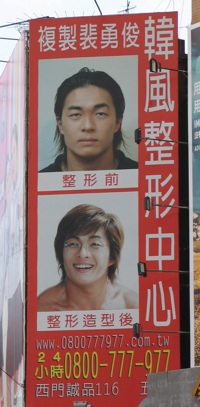I recently blogged an enjoyable chat with an elderly Korean gentleman that I had outside the national library in Seoul and shared some of his stories about life in colonial Korea and during the turbulent years that followed.
Today Sayaka and I are spending a leisurely afternoon reading in a Taipei coffee shop (chain) called QK咖啡. Although their motto is “ranQueen ranKing” which seems to explain the Q and the K in their name, we noticed the elderly Taiwanese couple sitting next to us talking about the name. The same couple had earlier taken notice of the fact that Sayaka and I were often using Japanese with each other. When they pointed the “QK” out to each other and read it out loud, our eyes met and I told them, in Chinese, that I just realized that the name is actually quite interesting. When you pronounce “QK” together you also get the Japanese word 休憩 or “kyûkei” which means “to rest” or “to take a break.” Since it isn’t unusual at all to see Japanese words in the names of Taiwanese stores and restaurants (For example, Sayaka lives very close to a coffee shop called 黒潮 (the Japan Current), which has the Japanese pronunciation for these characters, “Kuroshio” written next to it), we believe it simply can’t be a coincidence that the title of the coffee shop ends up a play on a Japanese word (the whole store name read in Japanese also makes a nice alliterative Kyûkei Kôhii, as it does in Chinese, QK Kafei).
Having thus broken the ice, the Taiwanese couple asked Sayaka if she was Japanese and started to speak to us in absolutely fluent Japanese. We complimented their Japanese and they said that they had both spoken Japanese as children through until they graduated from junior high school. If they graduated from junior high school in 1945, which at least the husband claimed to have, that would now make them about 75 years old. With this as an opening, we asked them all sorts of questions about their lives back during this time. As in my other encounters of this sort, they had lots of fascinating stories.
Continue reading Some Coffee Shop Oral History
